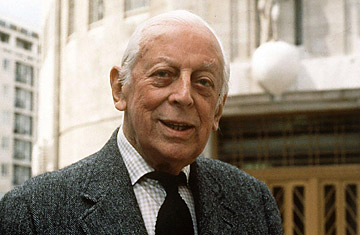
Journalist and broadcaster Alistair Cooke.
(2 of 2)
The Cambridge don was right: he had a journalist's mind to go with a diplomat's gifts of persuasion and tact. In the '30s he talked himself into a job as the BBC's movie critic. Soon he was doing political reportage and a kind of social commentary, never taking sides (even his children didn't know whom he'd voted for). In these stints, as in his Masterpiece Theater introductions, he'd often sketch out a speech, then deliver it without script or teleprompter, trusting his memory and high-wire poise. He was as much an improv master as the jazzmen he admired.
Beyond his journalistic facility, Cooke seemed to have a diviner's rod that led him toward powerful men and big stories. In 1931, on vacation in Munich, he stumbled onto a street speech by a local spellbinder: Adolf Hitler, two years before the Third Reich came to power. In 1936 Cooke wandered into an alley during Harvard's tricentennial celebration and saw two Secret Service men lean into a limo and lift out the polio-stricken "Franklin Roosevelt, inert as a sack of potatoes." In 1968 he was at the Ambassador Hotel when Robert Kennedy was shot, and filed one of the sharpest, coolest reports ever filed under the pressure of deadline and desperation.
TV viewers of the first cathode age knew Cooke as the front man for Omnibus, which ran on Sunday afternoons on CBS, then ABC, then NBC, from 1952 to 1961. This 90 min. melange of the arts highlighted the lions of the day in music (Leonard Bernstein was a frequent guest), dance (Gene Kelly demonstrated how baseball was like ballet) and short dramatic pieces (like William Inge's "Glory in the Flower," with Hume Cronyn, Jessica Tandy and the 22-year-old James Dean). The ringmaster was Cooke, who easily convinced early TV viewers that culture could be enlightening, challenging and fun.
Like many men who project an easy intimacy over the airwaves, and are adopted by the public as a surrogate uncle or next-door neighbor, Cooke could be distant from his own domestic life. His 1934 marriage to Ruth Emerson, Ralph Waldo Emerson's grand-niece, ended in divorce, and he showed little interest in their son John. The Unseen Alistair Cooke shows a home movie the father shot of his six-year-old son's train set, but the footage is all about the toy trains; young John's role was excised before shooting. When his stepdaughters from his 1946 marriage to Jane Hawkes joined a London cult called The Process, and needed extradition, Cooke declined to make the trip. He made few visits to Blackpool, and stayed away from the funerals of his parents, who represented everything he had fled from.
It was enough for Cooke that PBS viewers in America, and BBC listeners around the world, considered him a spirited, spirit-lifting member of their families. His Letters broadcasts often began with remarks about the view from his Fifth Avenue window, and letters from many countries, which bore the address "Alistair Cooke, Overlooking Central Park," ended up in his mail box. The man who knew everybody had the knack of making millions of strangers feel they knew him. That's the talent of a politician more than a journalist. But as The Unseen Alistair Cooke reveals, the man was no rabble-rouser. He was a rabble-raiser. People on the other end of one of Alistair Cooke's tours felt smarter and warmer, thinking they knew him.
